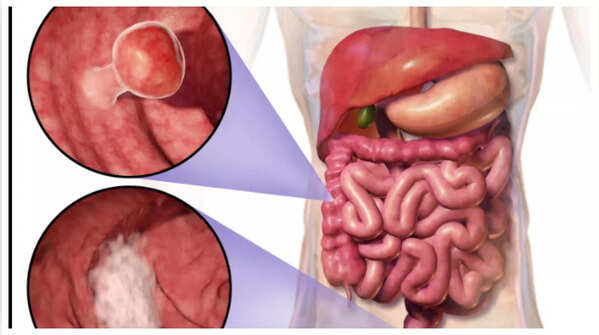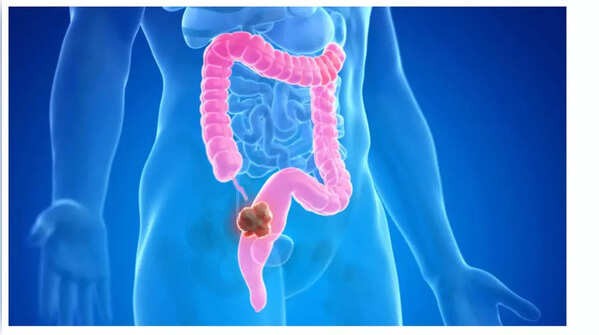Colon cancer, also known as colorectal cancer, develops in the colon or rectum, the final section of the large intestine. It frequently begins as benign cell clusters called polyps, which can become cancerous over time. While most colon cancers arise spontaneously, factors like family history, obesity, and lifestyle choices can elevate the risk. Predominantly affecting individuals over 50, early symptoms are often subtle, easily mistaken for routine digestive problems or stomach infections. However, certain warning signs should never be ignored.

Here are five early symptoms of colon cancer that are easy to miss:
One of the earliest indicators of colon cancer is a noticeable alteration in bowel habits, characterized by:
These changes may seem insignificant or temporary, often attributed to diet, stress, or minor infections. However, persistent bowel changes lasting more than a few days or recurring frequently could signal colon cancer. These persistent shifts suggest a growing tumor disrupting normal bowel function.

The presence of blood in stool should always warrant medical attention, regardless of the suspicion of colon cancer. It may manifest as:
In some instances, the bleeding might be microscopic, leading to anemia over time. While blood in the stool can stem from various conditions like hemorrhoids or infections, it's crucial to rule out colon cancer, especially if it occurs repeatedly or alongside other concerning symptoms.

Persistent abdominal discomfort represents another early symptom frequently overlooked. This may involve:
Such discomfort might be mistaken for indigestion or minor digestive issues like constipation. However, if the pain is continuous and unrelated to dietary or lifestyle changes, it could suggest a tumor causing irritation or blockage within the colon.

Unexplained and persistent fatigue or weakness can be a subtle indicator of colon cancer, particularly when accompanied by other factors. Gradual, unnoticed bleeding in the colon can lead to iron deficiency anemia. With a reduced number of red blood cells, the body struggles to transport sufficient oxygen, resulting in fatigue, shortness of breath, and weakness. While these symptoms may be dismissed as stress-related or due to lack of sleep, medical evaluation is advisable.

Unintentional weight loss is a common symptom across many cancers, including colon cancer. When the body is battling cancer, the immune system remains in a constant state of activation, and tumors can disrupt digestion and appetite. Significant weight loss without any changes in diet or exercise warrants a visit to the doctor. While this symptom often emerges later, it can occasionally serve as an early warning sign.

Disclaimer: This information is for educational purposes only and does not substitute professional medical advice. Always consult a qualified healthcare provider for any health concerns.
Sources:
Newer articles
Older articles
 Prithvi Shaw Admits to Losing Focus, Blames "Wrong Friends" for Career Setback
Prithvi Shaw Admits to Losing Focus, Blames "Wrong Friends" for Career Setback
 Test Your Vision: Can You Find All the Hidden Animals in This Viral Optical Illusion?
Test Your Vision: Can You Find All the Hidden Animals in This Viral Optical Illusion?
 7 Science-Backed Strategies to Naturally Elevate Oxytocin, the 'Love Hormone'
7 Science-Backed Strategies to Naturally Elevate Oxytocin, the 'Love Hormone'
 Azhar Mahmood Named Interim Test Coach for Pakistan
Azhar Mahmood Named Interim Test Coach for Pakistan
 Smith Aims for Second Test Return After Unique Baseball Cage Training in NYC
Smith Aims for Second Test Return After Unique Baseball Cage Training in NYC
 Aamir Khan Details Underworld Invite to Dubai Party, Refusal Amid Family Safety Fears
Aamir Khan Details Underworld Invite to Dubai Party, Refusal Amid Family Safety Fears
 Tiêu đề:
Unveiling the New 7 Wonders of the World: A Traveler's Guide to History's Greatest Masterpieces
Tiêu đề:
Unveiling the New 7 Wonders of the World: A Traveler's Guide to History's Greatest Masterpieces
 Foods to Avoid on an Empty Stomach: What Not to Eat First Thing in the Morning
Foods to Avoid on an Empty Stomach: What Not to Eat First Thing in the Morning
 Jury Begins Deliberations in Diddy Sex Trafficking Trial; No Verdict on Day One
Jury Begins Deliberations in Diddy Sex Trafficking Trial; No Verdict on Day One
 Sridevi's 'Laadla' Set Haunted by Late Divya Bharti's Unfinished Scene: Raveena Tandon Recalls Eerie Moments
Sridevi's 'Laadla' Set Haunted by Late Divya Bharti's Unfinished Scene: Raveena Tandon Recalls Eerie Moments